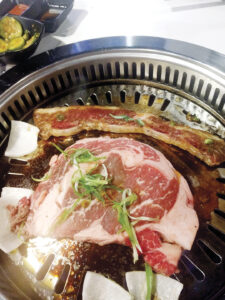DZÔ Korean BBQ
4/5/2023
Kalbi and ribeye at DZÔ Korean BBQ.
What’s in a name? Would a dzo, by any other, not taste the same? In Des Moines, it would not because this Korean steakhouse uses beef, not the offspring of a cow and a yak that is its namesake. Too many years of watching Andrew Zimmern’s “Bizarre Foods” made me ask.
DZÔ Korean BBQ fits well within the new category of experiential dining. Diners cook their own dinners over sunken, gas fired grills in the middle of tables that seat six people. Rather loud music also encourages them to feel something different from traditional dining.
Korean cuisine is taking off on the west coast; it has been for years. Korean food burst out of Koreatown in Los Angeles via food trucks, where it merged with Mexican flavors and spread like all tasty things will. Korean cuisine has long been dismissed by the Japanese for using bold, unrefined ingredients like garlic, chilies and fermentation. Korea and Japan actually had an international conflict because Japanese “kimchi” was not fermented. Japan quit using the word. Today, the bolder flavors are popular with younger Americans.
DZÔ has a full line of banchan. Those are small, usually pickled dishes meant for sharing. Our meals included seven banchan including winter radish, cabbage, spinach, bean sprouts, potato salad, chilies, cucumber, salted fish and squash. These change from one visit to another and are refilled.
Those are not the only appetizers; in fact, they aren’t even on the menu. Chick-charron were a Korean take on Mexican pork skins. They were made with fried chicken skins. If this is where all the skins go when they are rejected by “boneless, skinless” chicken butchers, then it’s all good. They were crispy and crunchy wonders. “Boom boom bao” were delicious mini tacos — pork belly, radish, cucumber kimchi and hot sauce on steam buns.
Korean fried chicken and fried chicken sliders (on brioche) were made with thighs and wings; egg rolls with pork and vegetables. Blistered shishito peppers were served with garlicky soy sauce.
Noodle dishes included both Italian-type wheat pasta and sweet potato pastas, both served as stir-fried offerings. Rice entrees included vegetarian and pork versions with kimchi and also “bimbimbap” which included grilled steak, fried egg, spinach, cucumber and bean sprouts, raw, cooked and fermented.
The dishes I found myself remembering days later were both called stews. One was “haemul sundubu jjigae” — a combination of tofu, calamari, shrimp and mushrooms. The other “kimchi jjigae” — a hot and sour mix of tofu, pork belly and mushrooms.
The stars of the show are the meats. Kalbi is short rib of beef that has been flankened, meaning cut thinly and against the direction of the bone. This is eschewed by Europeans who prefer cooking short ribs slow to tenderness. It is loved by Koreans and Mexicans who want to grill it fast to chewiness. Ribeye, filet, flat iron, New York strips and tri tip (California BBQ) are treated more familiarly. Pork belly won over my groups. It was sourced from kurobuta pigs, which are pampered Japanese Berkshires.
DZÔ offers upgrades to wagyu cuts. Those are heavily marbled meats that come from the same special cattle breed as Kobe. Steaks are all cut thinner than in American steakhouses. The grills in the tables never really get hot enough to sear beef like “Pittsburgh” fans like, so thicker cuts would not work.
The restaurant consists solely of six-top tables, plus bar seating without grills. This is awkward for couples who take up four extra potential seats. We arrived once at opening, 5 p.m., on a Monday, and people without reservations were already being turned away. No table that night had six, and only two had more than two. Make a reservation!
Parking is difficult, as the restaurant’s lot is shared with a bar and another restaurant, and Ingersoll has destroyed most street parking.
Jim Duncan is a food writer who has been covering the central Iowa scene for more than five decades.























